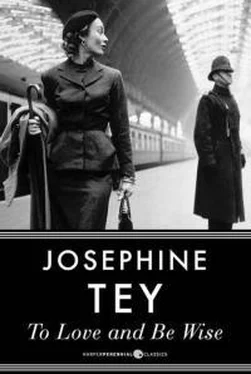‘He is – uncanny,’ Lavinia said, unhappily. ‘There is no other word. You wait and watch for the next thing he is going to do, as if it were – as if it were a sign, or a portent, or a revelation, or something.’ She used the ‘you’ impersonally, but caught Liz’s eye and said challengingly: ‘Well, you do , don’t you!’
‘Yes,’ Liz said. ‘Yes, I suppose it is like that. As if – as if the smallest thing he does had significance.’
Lavinia picked up the chewed pencil from the desk and doodled with it on the blotter. Liz noticed that she was making figures-of-eight. Lavinia must be very troubled indeed. When she was happy she made herringbones.
‘It’s very odd, you know,’ Lavinia said, mulling it over in her mind. ‘I get the same “kick” out of being in a room with him that I would get out of being in a room with a famous criminal. Only nicer, of course. But the same feeling of – of wrongness.’ She made several furious figures-of-eight. ‘If he were to disappear tonight, and someone told me that he was just a beautiful demon and not a human being at all, I would believe them. So help me, I would.’
Presently she flung the pencil back on to the desk, and said with a little laugh: ‘And yet it’s all so absurd. You look at him and try to find out what is so extraordinary about him, and what is there? Nothing. Nothing that can’t be matched elsewhere, is there? That radiant fairness and that skin like a baby; that Norwegian correspondent of the Clarion that Walter used to bring down had those. He is extraordinarily graceful for a man; but so is Serge Ratoff. He has a nice gentle voice and an engaging drawl; but so have half the inhabitants of Texas and a large part of the population of Ireland. You catalogue his attractions and what do they add up to? I can tell you what they don’t add up to. They don’t add up to Leslie Searle.’
‘No,’ said Liz soberly. ‘No. They don’t.’
‘The – the exciting thing is left out. What is it that makes him different? Even Emma feels it, you know.’
‘Mother?’
‘Only it takes her the opposite way. She hates it. She quite often disapproves of the people I bring down, sometimes she even dislikes them. But she loathes Leslie Searle.’
‘Has she told you so?’
‘No. She didn’t have to.’
No, thought Liz. She did not have to. Lavinia Fitch – dear, kind, abstracted Lavinia – manufacturer of fiction for the permanently adolescent, had after all a writer’s intuition.
‘I wondered for a while if it was that he was a little mad,’ Lavinia said.
‘Mad!’
‘Only nor-nor-west, of course. There is an unholy attraction about people who are stark crazy in one direction but quite sane every other way.’
‘Only if you know about their craziness,’ Liz pointed out. ‘You would have to know about their mental kink before you suffered any unholy attraction.’
Lavinia considered that. ‘Yes, I suppose you are right. But it doesn’t matter, because I decided for myself that the “mad” theory didn’t work. I have never met anyone saner than Leslie Searle. Have you ?’
Liz hadn’t.
‘You don’t think, do you,’ Lavinia said, taking to doodling again and avoiding her niece’s eye, ‘that Walter is beginning to resent Leslie?’
‘Walter,’ Liz said, startled. ‘No, of course not. They are the greatest friends.’
Lavinia, having with seven neat strokes erected a house, put the door in it.
‘Why should you think that about Walter?’ Liz said, challenging.
Lavinia added four windows and a chimney stack, and considered the effect.
‘Because he is so considerate to him.’
‘Considerate! But Walter is always –’
‘When Walter likes people he takes them for granted,’ Lavinia said, making smoke. ‘The more he likes them the more he takes them for granted. He even takes you for granted – as you have no doubt observed before now. Until lately he took Leslie Searle for granted. He doesn’t anymore.’
Liz considered this in silence.
‘If he didn’t like him,’ she said at length, ‘he wouldn’t be doing the Rushmere with him, or the book. Well, would he?’ she added, as Lavinia seemed wholly absorbed in the correct placing of a doorknob.
‘The book is going to be very profitable,’ Lavinia said, with only a hint of dryness.
‘Walter would never collaborate with someone he didn’t like,’ Liz said stoutly.
‘And Walter might find it difficult to explain why he didn’t want to do the book after all,’ Lavinia said as if she had not spoken.
‘Why are you telling me this?’ Liz said, half angry.
Lavinia stopped doodling and said disarmingly: ‘Liz darling, I don’t quite know, except perhaps that I was hoping you would find some way of reassuring Walter. In your own clever way. Which is to say, without dotting any I’s or crossing any T’s.’ She caught Liz’s glance, and said: ‘Oh, yes, you are clever. A great deal cleverer than Walter will ever be. He is not very clever, poor Walter. The best thing that ever happened to him was that you should love him.’ She pushed the defaced blotter away from her and smiled suddenly, ‘I don’t think, you know, that it is entirely a bad thing that he should have a rival to contend with. As long as there is no chance of the contention becoming serious.’
‘Of course it isn’t serious,’ Liz said.
‘Then suppose we get that moron out of the window, and finish the chapter before lunch,’ Lavinia said, and, picking up the pencil, began to chew on it again.
But a sense of shock stayed with Liz while she recorded, for the ultimate benefit of the lending libraries and the Inland Revenue, the doings of Sylvia the moron. It had not occurred to her that her awareness of Searle could be known to anyone but herself. Now it seemed that not only did Lavinia know very accurately how she felt about him, but she hinted that Walter too might know. But that surely was impossible. How could he know? Lavinia knew because, as she so frankly said, she too was a victim of the Searle charm. But Walter would have no such pointer to her emotions.
And yet Lavinia had been so right. Walter’s first easy taking-for-granted attitude to the visitor had changed to a host and guest relationship. It had changed imperceptibly and yet almost overnight. When and why had it changed? There was the unfortunate coinciding of the two so-different boxes of sweets; but that could hardly have rankled in any adult mind. The buying of candy for a girl was an automatic reflex with Americans; of no more significance than letting her go first through a doorway. Walter could hardly have resented that. How then could Walter have guessed the secret that was shared only by her fellow sufferer, Lavinia?
Her mind went on to consider Lavinia and her perceptions. She considered the one count that Lavinia had left out of the indictment – the snubbing of Toby Tullis – and wondered whether Lavinia had not mentioned it because she did not know, or whether she was merely indifferent to any suffering that Toby might be subjected to. Toby, as the whole village knew, was enduring the finest tortures of frustration since Tantalus. Searle had refused, with the most unimaginably kind indifference, to go to see Hoo House, or to take part in any of the other activities that Toby was eager to arrange for him. He had even failed to show any interest when Toby offered to take him over to Stanworth and present him. This had never happened to Toby before. His freedom to trot in and out of the ducal splendours of Stanworth was his trump card. He had never before played it in vain. With Americans especially it took the trick. But not with this American. Searle wanted no part of Toby Tullis, and made it clear with the most charming good manners. He stonewalled with a grace that for all its mordant quality was delightful to watch. Intellectual Salcott watched it with open delight.
Читать дальше











